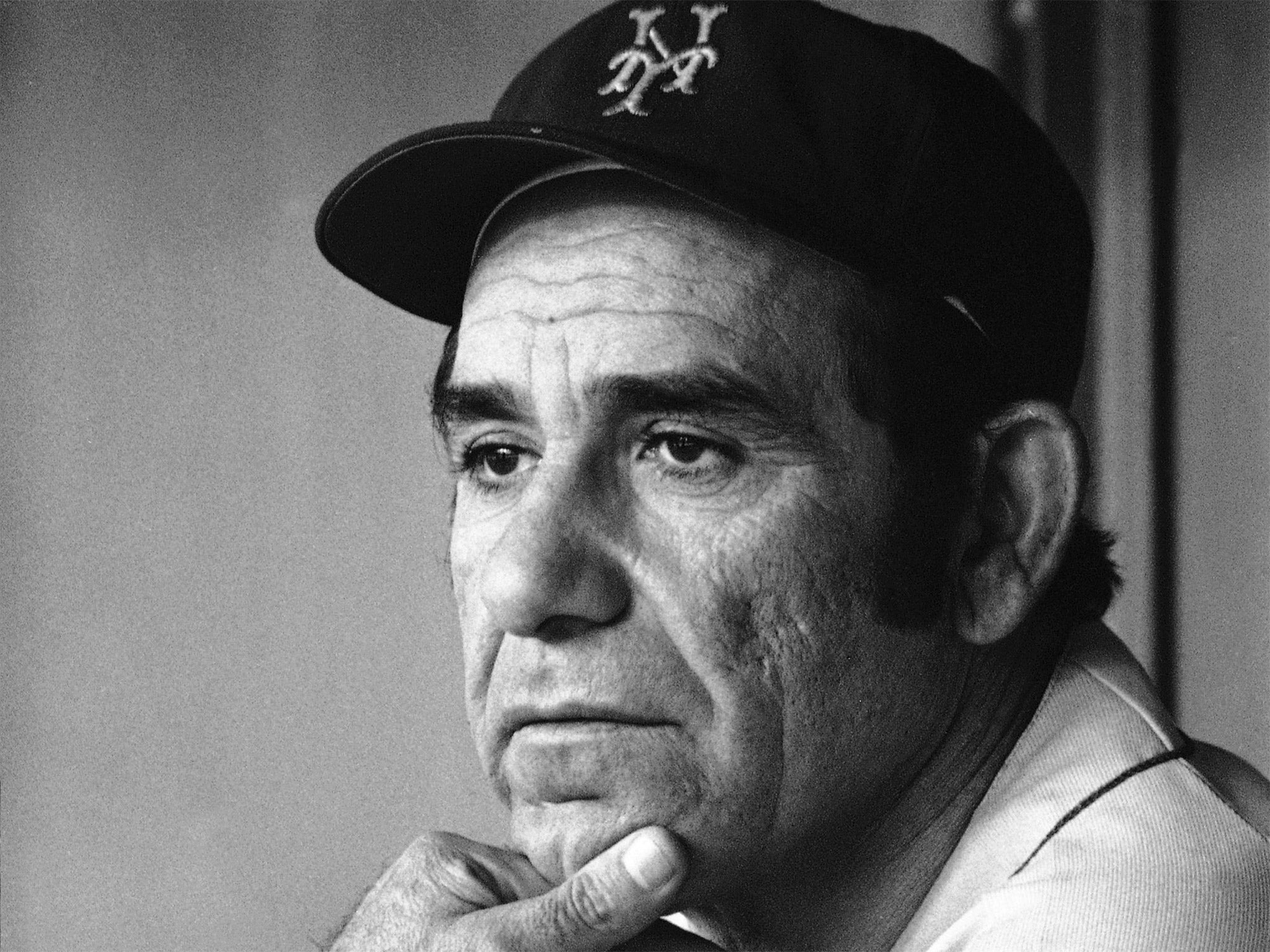Yogi Berra was a master of malapropisms ... but then sportspeople say the funniest things
Yogi Berra was as famous for his turn of phrase as he was for playing baseball. Simmy Richman looks at the strange and strained relationship between sporting folk and syntax

Your support helps us to tell the story
From reproductive rights to climate change to Big Tech, The Independent is on the ground when the story is developing. Whether it's investigating the financials of Elon Musk's pro-Trump PAC or producing our latest documentary, 'The A Word', which shines a light on the American women fighting for reproductive rights, we know how important it is to parse out the facts from the messaging.
At such a critical moment in US history, we need reporters on the ground. Your donation allows us to keep sending journalists to speak to both sides of the story.
The Independent is trusted by Americans across the entire political spectrum. And unlike many other quality news outlets, we choose not to lock Americans out of our reporting and analysis with paywalls. We believe quality journalism should be available to everyone, paid for by those who can afford it.
Your support makes all the difference.We may well be two nations separated by a common language, but sometimes we Brits and our American counterparts need different neologisms to explain the same cultural phenomenon. In England, we call them Colemanballs, after the late commentator David Coleman. In America, they call them Yogi-isms, after the legendary New York Yankees baseball player Yogi Berra, who died this week.
Whatever you choose to call them, everyone seems to agree that these gaffes, non-sequiturs, tautologies, paradoxical contradictions and general manglings of our (more-often-than-not) common language seem to spring most readily from the mouths of sportspeople. For his part, Berra gave us such snippets of wisdom as "If you come to a fork in the road, take it", "You can observe a lot by watching" and "It's déjà vu all over again." He also, presciently as things turned out, coined "It ain't over till it's over", when it looked as if his team had no chance of winning and then turned things around on the final day of the season.
What better way, then, to mark the passing of Berra than to gather together in one place some of the most glorious examples of Yogi-balls or Coleman-isms from either side of the pond?
* "The game is not over until it is." (Dwight Yorke, perhaps in twisted tribute to Berra.)
* "He's got his hands on his knees and holds his head in despair." (The British master of the form, David Coleman.)
* "He's one of the greatest players in the world, if not one of the greatest anywhere." (Table tennis player turned sports agent Sky Andrew.)
* "Not to win is guttering." (Mark Noble, West Ham United footballer.)
* "I never make predictions and I never will." (Paul Gascoigne, former footballer.)
* "You can never say never unless you say never yourself." (Stan Collymore, former footballer.)
* "Winning matches is still the best recipe for winning." (Serena Williams, tennis player.)
* "Laura Robson has just made the best possible start to her professional tennis career, she won the first set and lost the next two and is out." (Virginia Wade, former tennis player.)
* "Nobody in football should be called a genius. A genius is a guy like Norman Einstein." (Joe Theismann, commentator and former American footballer.)
* "We didn't underestimate them, they were a lot better than we thought." (Bobby Robson, former England football team manager.)
* "I owe a lot to my parents, especially my mother and father." (Greg Norman, golfer.)
* "Sure there have been injuries and deaths in boxing – but none of them serious." (Alan Minter, former boxer.)
* "My sister's expecting a baby, and I don't know if I'm going to be an uncle or an aunt." (Chuck Nevitt, former basketball player.)
* "I've had to overcome a lot of diversity." (Drew Gooden, basketball player.)
* "We must have had 99 per cent of the match, it was the other three per cent that cost us." (Ruud Gullit, former footballer and manager.)
And there you have it. Perhaps it's the intensity of the game. Perhaps it's true that a person can never have brawn and brain in equal measure and perhaps it's just another way for snobby language pedants to look down their noses at others. Whatever the reason, from magnificent malapropisms to mangled syntax via the most passing of acquaintances with basic arithmetic, members of the sporting fraternity do, it seems, have a propensity for these grammatical slip-ups.
But it should also be remembered that, occasionally, just occasionally, sportspeople can also turn words into beautiful phrases that will be with us long after the works of many a Booker Prize winner are forgotten. It was, after all, the boxer Muhammad Ali who claimed he could "float like a butterfly, sting like a bee". It was the American football player Vince Lombardi who said, "It's not whether you get knocked down; it's whether you get back up." It was the wrestler Ric Flair who gave the world "To be the man, you have to beat the man". And it was Eric Cantona who said something about seagulls, trawlers and sardines that some of the smartest minds in the world are still attempting to decode.
Berra, of course, had the last laugh. "It ain't over till it's over" has been used as the title of a scientific paper, an episode of Hill Street Blues and a hit record for Lenny Kravitz. Maybe, just maybe, Yogi Berra really was smarter than the average sportsperson.
Join our commenting forum
Join thought-provoking conversations, follow other Independent readers and see their replies
Comments